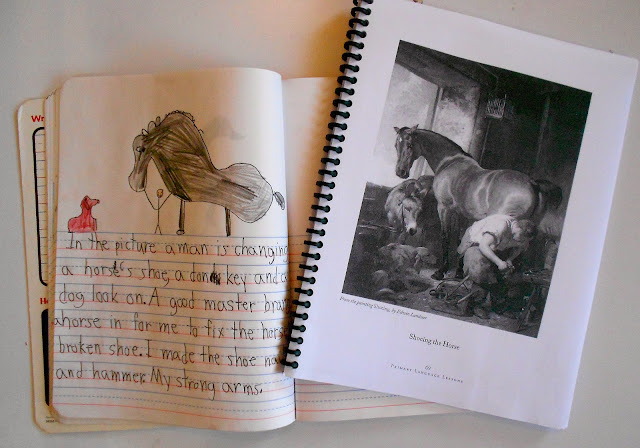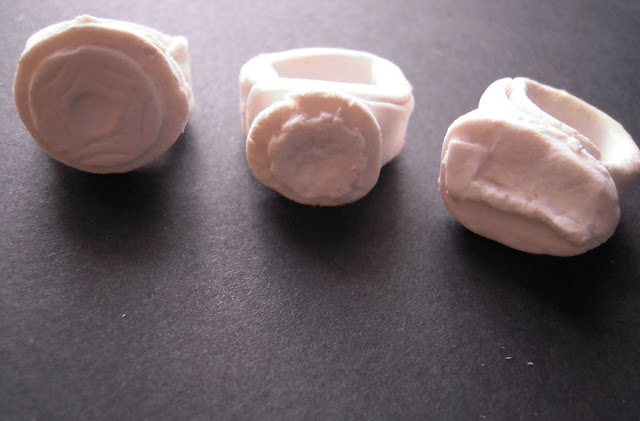Last week I wrote about our progress towards dropping the use of treats and rewards for lessons and I truly thought this week was going to be tough, however to my surprise the boys just slipped into line and followed my lead on this. I can count on one hand the times the subject of not getting treats was brought up and three out of the four incidents included the one who mentioned missing the treats to also remember we are not doing teats anymore and correcting himself. I am so pleased!
How could it have been so easy. I am not entirely sure, but a couple of things come to mind that I know were helpful. Firstly, I did eliminate treats for doing good work for their lessons but that did not mean I could not add in fun treats during our week just because. So I did. When I made a batch of strawberry ice cream in the morning before lessons to put away in the freezer I elicited their help to clean out the last bits in the ice cream maker. Spoonfuls of cool yummy ice cream just because. So I did not take good things away from them all together, I just reallocated them for a new purpose. They know I love to bless them when it is good for them, so they can trust me to be good and that the new change is ok.
Secondly, I realized this morning when I read a new post up over at Simply Charlotte Mason about too often the habit is a frustrater of the will, that I had a habit in place that was my ally not my opponent.
"Habit is either the ally or the opponent, too often the frustrater, of the will." Vol. 1 pg. 326
We have spent much of last year focusing on the habit of obedience, so this year when I made a change in the way I approached school they were already in the habit to follow me so the habit worked for their benefit and the switch was not so painful had it been if they were not already in the habit to just follow along. Yeah it is encouraging to see some of our hard work paying off.
 |
| The last of the flowers this year. |
Bible: We are just about to finish up Acts our reading through the book of Acts, just a few more chapters left an we are onto read Ephesians. Both of these books go well with out study of Greece and Rome this year as many of the places mentioned are in Greece and Rome. In Paul's trips to Rome we are getting a new picture of the historical cities mentioned in our history lessons as it is told from the Bible and from the point of view of the Christians who wrote it and live during that time period.
Mathematics: Same as last week but with X9.
Stories of Faith: In The
Adventures of Missionary Heroism we have been reading about John Horden, James Evans and The Riggs. They all working to share the gospel message to the indians of Canada and North America. We have gone from the hot places in Africa to the cold places in the Arctic. The boys like the stories but find the language and all the names of languages, people tribes etc very challenging. So we are taking the narrating slowly reading one paragraph or two before they retell it back to me. We could put the names on the board but they would still have a little trouble reading them just now, and it seems better at this point to be simply working on retelling the main ideas and not simply parroting back details. They are improving on this.
Ancient Greek History: We completed our reading of
In Search of a Homeland by Penelope Lively on friday and will be moving on to
The Children's Plutarch: Tales of the Greeks by F.J. Gould next week. I am taking Charlotte's advice and spending five days a week giving the boys a feast of ideas depending only on the narration, living books, and their hunger to learn to be enough to feed their minds good "mind stuff," and thus educate them. Last year I did a lot of hands on narration type projects feeling all the while the lessons were more mine than theirs and wondering how I could get out of doing so much. By doing what I mentioned above I am out of the way and their minds are meeting daily with great writers more equipped than I to share with them the knowledge they hunger for.
"I soon perceived that children were well equipped to deal with ideas, and that explanations, questionings, amplifications, are unnecessary and wearisome. Children have a natural appetite for knowledge which is informed with thought. They bring imagination, judgment, and the various so-called faculties to bear upon a new idea pretty much as the gastric juices act upon a food ration. This was illuminating but rather startling; the whole intellectual apparatus of the teacher, his power of avid presentation, apt illustration, able summing up, subtle questioning, (perhaps even hands-on-activities instead of a narration) all these were hindrances and intervened between children and the right nutriment duly served (literary ideas in living books); this, on the other hand, they received with the sort of avidity and simplicity with which a healthy child eats dinner." -Vol 6 Book 1, part 3
Having said this we still do a day of projects at the end of our week. This is done after five days of nourishing meals of literary ideas much the way as CM did handicrafts in the afternoon. I am being careful to fill them up with ideas from a literary source and not to replace that feeding with activities. This is not to say that we all do not benefit in some way from a hands-on-activity or a questioning say in the socratic method, but we must be sure they are fed plenty of literary ideas for their minds to grow on and let them digest it
on their own as they need it. As my children are growing older I can see they are preferring the 'mind stuff' over the other types of lessons we have done in the past which they often found wearisome. Not to say that they do not find narrating wearisome at this point too because they do, however not as much as cutting coloring etc we did last year. When we did hands-on-projects last year they begged to have something read as they worked. They are hungry for ideas.
Our history project this week was to do the armor of God hands-on-activity from
The Homeschool in the woods New testament activity pack. To introduce the lesson I played The
Full Armor of God You Tube Video and
The Armor of God Song and this
Armor of God Song while they worked. We also listened to
this rendition of Ephesians 6:10-20 read by James Earl Jones.
Aesop's copy work: Another 'ping' for Charlotte Mason here. Last week I adjusted the lesson so that the boys had five minutes of quiet time to complete the copy work portion of the page. Thus having only one focus for their minds. Then while they colored the picture I read from Aesop and In Search of a homeland. This week while narrating from In Search of a Homeland Zak is called on to retell the passage. He looks up frustrated from his coloring and says, " I don't know! How can I do two things at once!" Caught. My desire to fit in all in has divided his attention. But I will give myself some credit here, for when I was first having them narrate last year I read the
Ten Things to do with Your Child Before the age of Ten by the Bluedorn's and felt guilty because I
wasn't allowing them to play with anything while we narrated. Have you ever been caught between two knowledgeable people who recommend mutually exclusive things and not known what to do? Well I had already been thinking it may not be a good idea to have them playing while we narrate, but wasn't sure. Zak gave me the final answer. On other readings they will start playing with something and if they do not narrate well they must drop whatever it is and just listen. With boys that means they begin squirming around in their seat, smacking their lips, moving all the time. I find it a bit distracting so I am praying again about just how to handle this.
Science, Birds: Our reading of
The Tales of Rusty the Wren has been completed and we are onto
The Tales of Bobby Bobolink by Arthur Scott Bailey.
Nature Notebooks: I began to read a little from
A Pocket Full of Pinecones on the day we go outside to put an entry in our nature journals. I edit out some of the "teachy" parts written just for us mom's and just give them the story. Since literary sources for ideas stick best I am thinking that this little story may give the boys a fresh new idea about their nature notebooks.
Language Arts: We spent most of this week memorizing the poem Lady Moon. Though we approached it much the same way as we have before I switched it up a bit for I thought the boys would memorize this one easier than the two before. So we began the week by reciting the poem aloud. First I read the beginning lines and they repeat. Then I read the beginning lines and the next section, there are four sections. We repeat this pattern until they have the whole of the poem under their belt. Then the following day they copied the first and second sections into their composition books and drew a picture. Same thing the next day with the third and fourth section of the poem. Then on the fourth day we orally recited like we did on first day. They had the poem down well. Even with funny voices and al lot of laughter it was well done. On the fifth day we did a simple exercise in
Primary Language Lessons about was and were.
Latin: Our dialogue this week introduces verbs and the declensions for "I am" and "he/she is." So we spent most of the week listening to and reading and translating the dialogue. Once they had that down I asked them questions leading them to the discovery about when to use the 'o' ending for "I am" or the 't' ending for "he/she is" using inductive type questions used so often on our Primary Language Lessons.
On project day I read aloud to them the story of
Pandora as the newest character in our dialogues is named after the Pandora in this famous story.
On a side note I was wondering if anyone has ever tried to learn to read Latin using the CM reading method. After all much of the use of latin in later years is to read the original text of those writing in Latin. I may try it next year with the boys.
Art/Music:
Zak is busy cutting out and choosing three of his favorite art works by Paul Klee to add to his
Artist's Notebook page below. Usually we use Dover art stickers but I did not have any for Paul Klee, so I made some and printed them off for the boys to cut out. They will be included in my newest Artist Helper for Paul Klee soon.
Below are two of the four pages we filled with Klee artwork. This is their art work Gallery. The idea for this was inspired by
this post from Charlotte Mason Help. We use a three ring binder and
plastic money collectors pages. Then I made the cards and they put them into the pockets as they like. If you would like a set of these they are
here for FREE.
So this is our last lesson on Paul Klee. We go now to five weeks of drawing lessons.
In our lessons with Tchaikovsky we watched a
you tube presentation of swan lake. It took us three lessons to finish the four act ballet. The boys really enjoyed it. They were ecstatic when the Prince went to the lake in act two with his cross bow. They have been reenacting that all week long. They couldn't wait to see the evil guy come in every scene asking when he would return again and again. It was cool they enjoyed it all the way through even some of the long uneventful parts. They asked lots of good questions like, "How do the girls get their skirts to stay up like that?" and "Are they really dancing on their toes!?"
Outside of school the boys are helping my dh to paint the wall around our porch. Zak takes his turn.
Hope you have had a great week!


























































